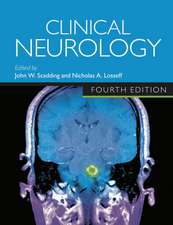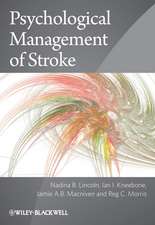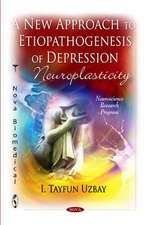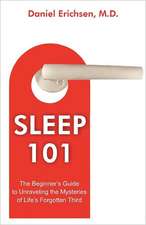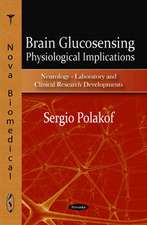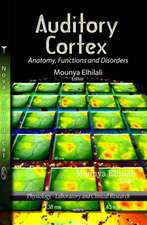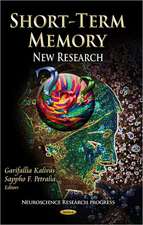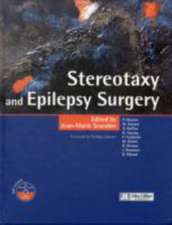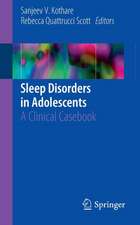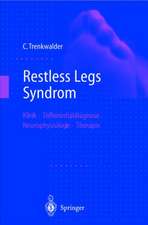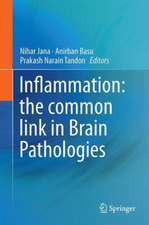Mitochondrial Dysfunction in Neurodegenerative Disorders
Editat de Amy K. Reeve, Eve M. Simcox, Michael R. Duchen, Doug M. Turnbullen Limba Engleză Hardback – 21 iun 2016
Additional chapters have been added to the book to reflectadvances in the field and there are many new contributors and topics, includinghow mitochondria are degraded and the interaction of the mitochondria withpathologically relevant proteins.
Mitochondrial Dysfunction in Neurodegenerative Disordersprovides an accessible, authoritative guide to this important area forneurologists; research and clinical neuroscientists; neuropathologists; andresidents with an interest in clinical research.
| Toate formatele și edițiile | Preț | Express |
|---|---|---|
| Paperback (1) | 872.93 lei 38-44 zile | |
| Springer International Publishing – 31 mai 2018 | 872.93 lei 38-44 zile | |
| Hardback (1) | 734.57 lei 3-5 săpt. | |
| Springer International Publishing – 21 iun 2016 | 734.57 lei 3-5 săpt. |
Preț: 734.57 lei
Preț vechi: 773.23 lei
-5% Nou
Puncte Express: 1102
Preț estimativ în valută:
140.58€ • 152.65$ • 118.08£
140.58€ • 152.65$ • 118.08£
Carte disponibilă
Livrare economică 02-16 aprilie
Preluare comenzi: 021 569.72.76
Specificații
ISBN-13: 9783319286358
ISBN-10: 3319286358
Pagini: 420
Ilustrații: XI, 380 p. 34 illus., 29 illus. in color.
Dimensiuni: 155 x 235 x 23 mm
Greutate: 0.89 kg
Ediția:2nd ed. 2016
Editura: Springer International Publishing
Colecția Springer
Locul publicării:Cham, Switzerland
ISBN-10: 3319286358
Pagini: 420
Ilustrații: XI, 380 p. 34 illus., 29 illus. in color.
Dimensiuni: 155 x 235 x 23 mm
Greutate: 0.89 kg
Ediția:2nd ed. 2016
Editura: Springer International Publishing
Colecția Springer
Locul publicării:Cham, Switzerland
Public țintă
Professional/practitionerCuprins
Part I.Mitochondria and Neurodegenerative Disease.- An Introductionto Mitochondria, Their Structure and Functions.- Part II.Mitochondrial Dysfunction: Causes and Effects?.- Neurodegeneration in Mitochondrial Disorders.- The Ageing Brain,Mitochondria and Neurodegeneration.- Mitochondrial Genes and Neurodegenerative Disease.- MitochondrialSignalling and Neurodegeneration.- Part III. Functional Consequences ofMitochondrial Dysfunction.- Life on the Edge: Determinants of SelectiveNeuronal Vulnerability in Parkinson’s Disease.- MitochondrialDynamics and Neurodegeneration.- Mitochondrial Dysfunction and Transport in Demyelinating Disease with Inflammation.-Mitochondria,the Synapse, and Neurodegeneration.- Protein Misfolding andAggregation: Implications for Mitochondrial Dysfunction and Neurodegeneration.-Mitochondrial Degradation, Autophagy andNeurodegenerative Disease.- The DeleteriousDuo of Neurodegeneration: Lysosomes and Mitochondria.- PartIV. Measuring theContribution of Mitochondrial Dysfunction to Neurodegenerative Disease.- CanWe Accurately Model Mitochondrial Dysfunction in Neurodegeneration?.- MitochondrialFunction and Dynamics Imaged In Vivo.-Part V. The Future.- Developmentof Treatments and Therapies to Target Mitochondrial Dysfunction.- Summary and Conclusions.
Notă biografică
Amy K. Reeve
Amy did her undergraduate degreein Neuroscience at Edinburgh University before moving to the MitochondrialResearch Group at Newcastle University for her PhD studies. She completed her PhDin the study of the molecular mechanisms of neurodegenerative disease in 2007and now has her own research group within the Wellcome Trust Centre forMitochondrial Research. Her current research interests centre aroundunderstanding the mechanisms behind the neurodegeneration seen in Parkinson’sdisease, and the contribution of mitochondrial dysfunction to these changes.Funded by Parkinson’s UK as a research fellow Amy’s interests lie inunderstanding how changes within mitochondria, mitochondrial transport and theinteraction of mitochondrial with alpha-synuclein contributes to thedevelopment of Parkinson’s disease.
Eve M. Simcox
Eve did her undergraduate degreein Biomedical Science at Newcastle University and continued her studies withinthe Mitochondrial Research Group for her PhD. She completed her PhD in thestudy of the turnover and dynamics of mitochondria in neurodegenerative diseasein 2014 and now works as the impact officer for the faculty of Science,Agriculture and Engineering.
Michael R. Duchen
Michael obtained his Bachelor of Medicine degree from Oxfordand London Universities, and moved to UCL for his PhD studies. He has remainedat UCL since, where he is now a Professor of Physiology. Michael founded andleads the UCL consortium for Mitochondrial Research and leads a successfulresearch group. Michael's interests lie primarily in understanding the relationshipsbetween mitochondrial biology and cell signalling. His research group's maininterest lies in understanding the inter-relationship between calciumsignalling, mitochondria and free radical biology in cell physiology andpathophysiology. Particular contributions have been made into understanding thecontribution of mitochondrial dysfunction to cell injury and death.Doug M. Turnbull
Professor Turnbull is a clinical academic who leads a basicscience research programme in conjunction with developing clinical services. Hehas three main roles.
Director of the Wellcome Trust Centre for MitochondrialResearch. The Wellcome Trust Centre is focused on research to improve the livesof patients with mitochondrial disease. This includes research to identify thegenetic defect in patients with mitochondrial disease and his work also focusesunderstanding the molecular mechanisms underlying the neurological features inpatients. With colleagues he is searching for new therapies for patients and activelyinvolved in clinical studies evaluating potential therapies. He has beenactively involved in work to prevent the transmission of mitochondrial DNAdisease using an IVF technique called mitochondrial donation. Lead for the NHS Highly Specialised Services for RareMitochondrial Services for Adults and Children. Professor Turnbull developedthis service provides optimum care for patients with mitochondrial diseasethroughout the UK with Centres in Newcastle, London and Oxford. This servicewas built on the back of clinical and basic research and the service reviews inexcess of 800 patients per year. The service has developed care pathways andpatient guidance that are used worldwide of the benefit of patients.
Director MRC/BBSRC Centre for Ageing and Vitality. ProfessorTurnbull has a major interest in understanding the basic mechanisms involved inhuman ageing with particular emphasis on the role of mitochondria. The MRCCentre is focused on understanding how these mechanisms are influenced bylifestyle interventions and studies aimed at promoting healthy ageing.
Amy did her undergraduate degreein Neuroscience at Edinburgh University before moving to the MitochondrialResearch Group at Newcastle University for her PhD studies. She completed her PhDin the study of the molecular mechanisms of neurodegenerative disease in 2007and now has her own research group within the Wellcome Trust Centre forMitochondrial Research. Her current research interests centre aroundunderstanding the mechanisms behind the neurodegeneration seen in Parkinson’sdisease, and the contribution of mitochondrial dysfunction to these changes.Funded by Parkinson’s UK as a research fellow Amy’s interests lie inunderstanding how changes within mitochondria, mitochondrial transport and theinteraction of mitochondrial with alpha-synuclein contributes to thedevelopment of Parkinson’s disease.
Eve M. Simcox
Eve did her undergraduate degreein Biomedical Science at Newcastle University and continued her studies withinthe Mitochondrial Research Group for her PhD. She completed her PhD in thestudy of the turnover and dynamics of mitochondria in neurodegenerative diseasein 2014 and now works as the impact officer for the faculty of Science,Agriculture and Engineering.
Michael R. Duchen
Michael obtained his Bachelor of Medicine degree from Oxfordand London Universities, and moved to UCL for his PhD studies. He has remainedat UCL since, where he is now a Professor of Physiology. Michael founded andleads the UCL consortium for Mitochondrial Research and leads a successfulresearch group. Michael's interests lie primarily in understanding the relationshipsbetween mitochondrial biology and cell signalling. His research group's maininterest lies in understanding the inter-relationship between calciumsignalling, mitochondria and free radical biology in cell physiology andpathophysiology. Particular contributions have been made into understanding thecontribution of mitochondrial dysfunction to cell injury and death.Doug M. Turnbull
Professor Turnbull is a clinical academic who leads a basicscience research programme in conjunction with developing clinical services. Hehas three main roles.
Director of the Wellcome Trust Centre for MitochondrialResearch. The Wellcome Trust Centre is focused on research to improve the livesof patients with mitochondrial disease. This includes research to identify thegenetic defect in patients with mitochondrial disease and his work also focusesunderstanding the molecular mechanisms underlying the neurological features inpatients. With colleagues he is searching for new therapies for patients and activelyinvolved in clinical studies evaluating potential therapies. He has beenactively involved in work to prevent the transmission of mitochondrial DNAdisease using an IVF technique called mitochondrial donation. Lead for the NHS Highly Specialised Services for RareMitochondrial Services for Adults and Children. Professor Turnbull developedthis service provides optimum care for patients with mitochondrial diseasethroughout the UK with Centres in Newcastle, London and Oxford. This servicewas built on the back of clinical and basic research and the service reviews inexcess of 800 patients per year. The service has developed care pathways andpatient guidance that are used worldwide of the benefit of patients.
Director MRC/BBSRC Centre for Ageing and Vitality. ProfessorTurnbull has a major interest in understanding the basic mechanisms involved inhuman ageing with particular emphasis on the role of mitochondria. The MRCCentre is focused on understanding how these mechanisms are influenced bylifestyle interventions and studies aimed at promoting healthy ageing.
Textul de pe ultima copertă
This second edition brings together up-to-date contributionsfrom leaders in the field internationally on the various ways in whichmitochondrial dysfunction contributes to the pathogenesis of neurodegenerativediseases, including Parkinson’s disease, Alzheimer’s disease and multiplesclerosis. The reader is guided through the basic functions of mitochondria andthe mechanisms that lead to their dysfunction, and on to the consequences ofthis dysfunction for neuronal function before finishing with the modelling ofthese disorders and discussion of new potential therapeutic targets.
Additional chapters have been added to the book to reflectadvances in the field and there are many new contributors and topics, includinghow mitochondria are degraded and the interaction of the mitochondria withpathologically relevant proteins.
Mitochondrial Dysfunction in Neurodegenerative Disordersprovides an accessible, authoritative guide to this important area forneurologists; research and clinical neuroscientists; neuropathologists; andresidents with an interest in clinical research.
Additional chapters have been added to the book to reflectadvances in the field and there are many new contributors and topics, includinghow mitochondria are degraded and the interaction of the mitochondria withpathologically relevant proteins.
Mitochondrial Dysfunction in Neurodegenerative Disordersprovides an accessible, authoritative guide to this important area forneurologists; research and clinical neuroscientists; neuropathologists; andresidents with an interest in clinical research.
Caracteristici
Discusses current research in a concise and logical format Explains concepts using schematic diagrams, images and tables Covers all aspects of the potential contribution of mitochondria to neurodegenerative diseases, from the simple to the more complex, both in terms of experimental data and literature review

